First published
“Big Brother is Watching You” is the sentence that people around the world have come to know through the novel 1984 or Nineteen Eighty-Four, that turned 70 this week.
Nineteen Eighty-Four is a novel about a nightmare future in the year 1984. It takes place in a totalitarian state where the Party is central to people’s everyday lives and where propaganda, surveillance, misinformation, and manipulation of the past are ubiquitous.
The book revolves around Winston Smith, a citizen of London, Oceania, who works at Minitrue (Ministry of Truth) and who secretly hates the society he lives in with its all-controlling Party, the ‘Big Brother’ leader, and the Thought Police.
Smith is critical of the workings of the Party and the lies it imposes, which then pass into history and become ‘truth’; as the Party slogan goes: “Who controls the past, controls the future: who controls the present controls the past.”
“Orwellian China”
There is probably no other country in the world that has been described as “Orwellian” in English-language media as often as China has over the past few years. According to Google Trends, ‘China’ currently is one of the most related topics people in the US are searching for when they type in the word ‘Orwellian’ on the search engine.
The topic recently most associated with Orwell’s novel is that of China’s Social Credit System. In October of 2018, US Vice President Mike Pence addressed China’s nascent Social Credit System in a speech on China, calling it “an Orwellian system premised on controlling virtually every facet of human life” (Whitehouse.gov).
Since then, George Orwell and Nineteen Eighty-Four have been used more often to describe developments in China.
‘Orwellian’ and ‘China’ come up with more than 28,000 results in Google News alone, the term often being used with any PRC news that relates to technology, government control, and propaganda.
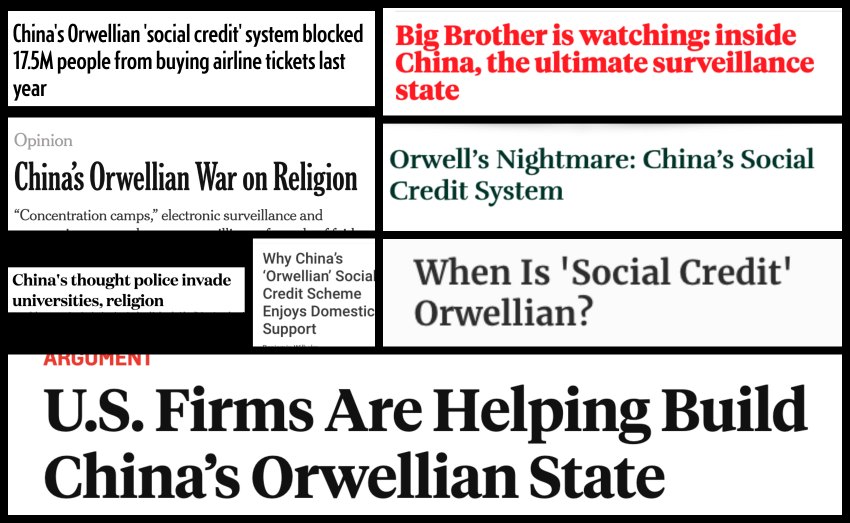
Ironically, many of the news reports addressing ‘Orwellian China’ and its Social Credit System (SCS) are, in the Orwellian tradition, spreading misinformation themselves, conflating different issues or presenting speculation as fact – see some examples of speculative reporting on the SCS in this list.
But also when reporting on China’s growing mass camera surveillance, the Xinjiang internment camps, the launch of the ‘Study Xi, Strengthen China’ [Xuexi Qiangguo] app, or the increasing use of facial recognition, the comparison to George Orwell’s 1949 classic is everywhere in the English language media world today.
一九八四: Orwell’s Nineteen Eighty-Four in China
For a country that is labeled ‘Orwellian’ so often, it is perhaps surprising that Nineteen Eighty-Four is actually not censored or banned in the People’s Republic of China (PRC).
Since the first PRC edition of the novel was published in 1979, it has become a famous and well-read work that is available for purchase in Chinese or English in all big bookstores in Chinese cities or online via e-commerce sites as Taobao.com.
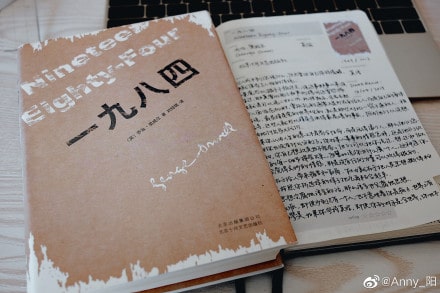
The famous sentence “Big Brother is Watching You” translates to “Lǎo dàgē zài zhùshìzhe nǐ” (“老大哥在注视着你”) in Mandarin, and often pops up on social media, together with terms such as “doublethink” (shuāngchóng sīxiǎng, 双重思想) or “Thought Police” (sīxiǎng jǐngchá 思想警察).
On Douban, an influential web portal that allows users to rate and review books, films, etc, various editions of Nineteen Eighty-Four (most of them translated by Dong Leshan 董乐山) have been rated with a 9.3 or higher by thousands of web users.
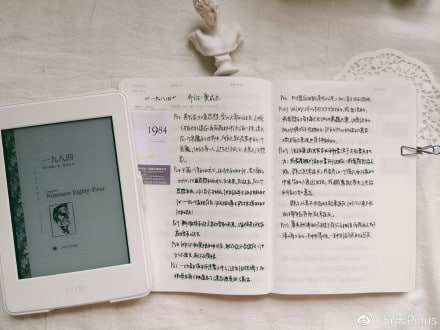
Reading 1984, by Weibo user @耀离Pinus.
“I like this book, it’s just a bit too dark for me,” some reviewers write, with others just saying the book is “very scary,” or seeing some resemblance with the classic works of Chinese authors such as Wang Xiaobo or Lu Xun.
WeChat blog Vopoenix recently stressed the importance of Nineteen Eighty-Four, writing that the novel is not anti-socialism per se: “What Orwell really opposes is fascism, totalitarianism, and nationalism (..), what he really supports is political democracy and social justice.”
70 years later, totalitarianism still has not disappeared, the blog writes: “(..) instead, it has evolved with the times in a more secret way (..). We still need independent, keen and courageous thinkers like George Orwell. We still need 1984.”
One Douban reviewer writes about their thoughts after reading Nineteen Eighty-Four, saying: “What scares me is that sometimes people will ridicule North Korea for being so shut off from the world, but what about us? We’re like frogs at the bottom of a well, but the scary thing is, we don’t even know we’re in the well.”
“Just a work of fiction to Chinese”?
Public sentiments about the 70-year-old Nineteen Eighty-Four novel bearing a resemblance to (present-day) China are seemingly growing stronger on Chinese social media recently. The book appears in online comments and discussions on a daily basis.
“I finished reading the book today,” one Weibo commenter writes: “The biggest thought I had is: this book is very suitable for Chinese people to read.”
“I can now imagine what those ten years were like,” one Douban user posts, referring to the Cultural Revolution (1966-1976).
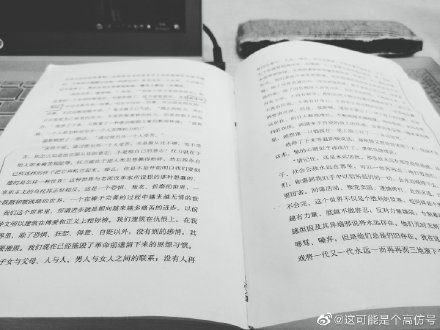
“Nineteen Eighty-Four is the first satirical book I’ve read that comes close to the situation in China. If you read it, you’ll know what I mean,” another reader writes.
Different from English-language (social) media, Chinese commenters are not mentioning the book in relation to the country’s Social Credit System at all, but in relation to the heightened censorship that China has recently been seeing in light of the China-US trade war, the Tiananmen anniversary, and the Hong Kong protests.
One Weibo blogger writing a critique about the growing “bizarreness” of the “elephant in the room” (referring to all those big China-related issues that cannot be discussed on social media due to censorship) attracted the attention of Chinese netizens earlier this week (see the full translation of post here).
Many commenters spoke about the Weibo post in relation to Nineteen Eighty-Four, especially when the post addressing the censorship was censored itself.
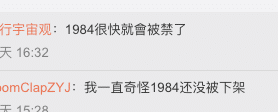
Some commenters are speculating that Orwell’s novel might one day be banned in China.
Others also wrote that it seemed “like a miracle” that the book was not banned in China, and some suggested it might still happen in the future.
“It will be forbidden very soon,” one Weibo commenter speculates.
“The future is becoming more difficult, really,” one netizen recently wrote: “It’s nearing 1984 (一九八四), and [we] might not be able to see it later.”
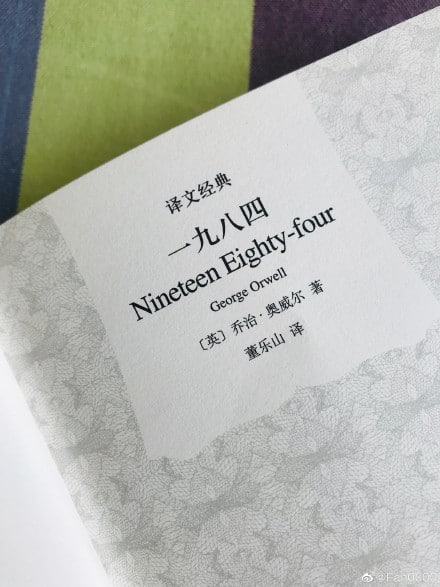
But, in Chinese online media, Nineteen Eighty-Four is by no means only mentioned in relation to China. There are also those blogs or news articles that mention the Orwellian aspects of the story of Edward Snowden, or connect Orwell to Trump’s America.
In late 2018, state tabloid Global Times denounced the ubiquitous Western media reports on “Orwellian China.” Author Yu Jincui wrote:
“Orwell’s Nineteen Eighty-Four is a classic to Westerners, but it is just a work of fiction to Chinese and they are fed up with Orwellian style preaching from Western elites. This kind of conversation will lead nowhere.”
But many netizens do not agree with the fictional part. “Nineteen Eighty-Four is not a work of fiction, it is a record of our future,” one Weibo user writes.
“Is Big Brother watching me?” others wonder.
“The first time I read it, I just read it,” another Douban user says: “The second time I read it, I really started to understand. Here’s to George Orwell!”
Despite all speculation on social media, there are no indications that Nineteen Eighty-Four will be banned from China any time soon.
For now, even 70 years after its first publication and 40 years after its first Chinese translation, readers in the People’s Republic can continue to devour and discuss Orwell’s classic work and the mirror it holds up to present-day China, America, Europe, and the world today.
By Manya Koetse
Follow @whatsonweibo
PS: Some recommended reading on Social Credit in English:
* Creemers, Rogier. 2018. “China’s Social Credit System: An Evolving Practice of Control.”May 9. Available at SSRN: https://ssrn.com/abstract=3175792.
* Dai, Xin. 2018. “Toward a Reputation State: The Social Credit System Project of China.” June 10, available at SSRN: https://ssrn.com/abstract=3193577 or http://dx.doi.org/10.2139/ssrn.3193577.
* Daum, Jeremy. 2017. “China through a glass, darkly.” China Law Translate, Dec 24 https://www.chinalawtranslate.com/seeing-chinese-social-credit-through-a-glass-darkly/?lang=en [24.5.18].
* Daum, Jeremy. 2017. “Giving Credit 2: Carrots and Sticks.” China Law Translate, Dec 15 https://www.chinalawtranslate.com/giving-credit-2-carrots-and-sticks/?lang=en [27.5.18].
* Horsley, Jamie. 2018. “China’s Orwellian Social Credit Score Isn’t Real.” Foreign Policy, Nov 16 https://foreignpolicy.com/2018/11/16/chinas-orwellian-social-credit-score-isnt-real/ [10.6.19].
* Koetse, Manya. 2018. “Insights into the Social Credit System on Chinese Online Media vs Its Portrayal in Western Media.” What’s on Weibo, Oct 30 https://www.whatsonweibo.com/insights-into-the-social-credit-system-on-chinese-online-media-and-stark-contrasts-to-western-media-approaches/
* Koetse, Manya. 2018. “Open Sesame: Social Credit in China as Gate to Punitive Measures and Personal Perks.” What’s on Weibo, May 27 https://www.whatsonweibo.com/open-sesame-social-credit-in-china-as-gate-to-punitive-measures-and-personal-perks/.
* Kostka, Genia. 2018. “China’s Social Credit Systems and Public Opinion: Explaining High Levels of Approval” SSRN, July 23. Available at https://ssrn.com/abstract=3215138 or http://dx.doi.org/10.2139/ssrn.3215138 [29.10.18].
Spotted a mistake or want to add something? Please let us know in comments below or email us. Please note that your comment below will need to be manually approved if you’re a first-time poster here.
©2019 Whatsonweibo. All rights reserved. Do not reproduce our content without permission – you can contact us at info@whatsonweibo.com
The post Nineteen Eighty-Four Turns 70: Orwellian China and Orwell in China appeared first on What's on Weibo.